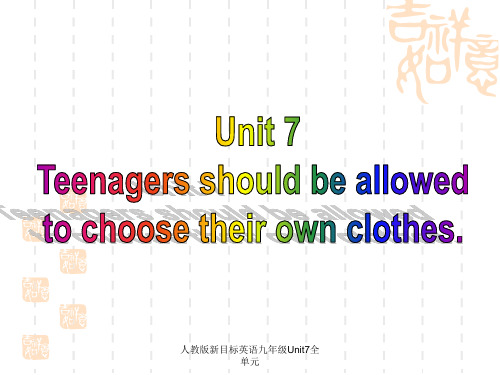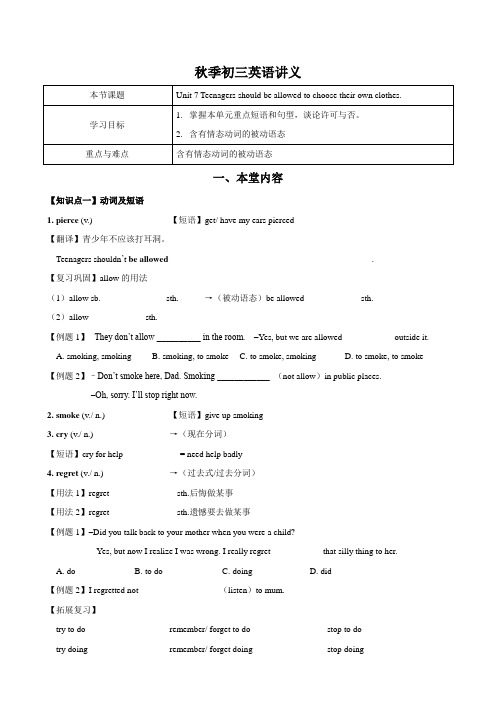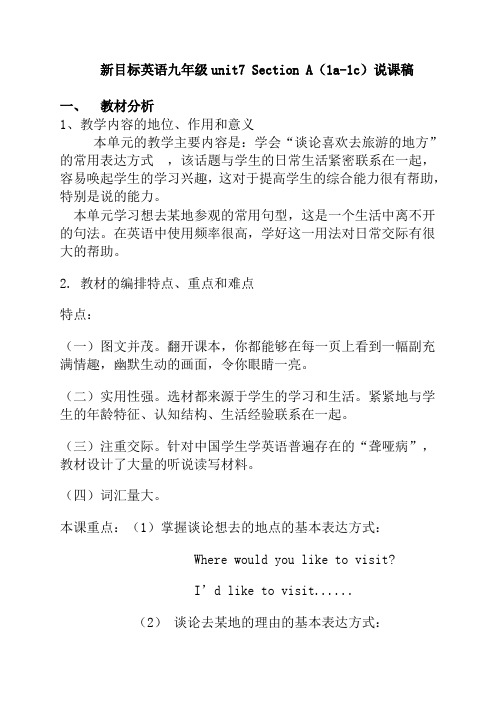新目标英语九年级导学案Unit7
- 格式:doc
- 大小:123.00 KB
- 文档页数:18

Unit 7 Teenagers should be allowed to choose their own clothes.Self Check导学案一.单项选择:( )1.Tom, your hair is too long. Why not get your hair______?A. cutB. to cutC. cuttingD. be cut( )2.I think teenagers should________ to choose their own clothes.A. allow toB. be allowingC. be allowedD. to allow( )3.He said he regretted ________ his parents.A. talking backB. talking back toC. to talk backD. talk back to( )4.His brother is_______ his school swimming team. A. of B. on C. at D. for ( )5.When Mom came in, the baby stopped _______ and laughed.A. to cryB. cryingC. criedD. cries( )6.In many western countries, teenagers_______ to move out at eighteen.A. allowedB. are allowedC. is allowedD. allowing( )7.Mobile phones must_______ off during the meeting.A. keepB. be keepingC. be keptD. kept( )8.He is serious________ running. He wants to be a professional runner.A. for B in C. at D. about( )9.----I don’t know if your sister____ tomorrow.---If she______, she will come to visit you.A. comes, will comeB. will come, will comeC. comes, comesD. will come, comes ( )10.----I think teenagers should be allowed to have part-time jobs?----______. They can learn a lot from working. A.I think B.I agree C.I don’t think so D.I disagree 二.从方框中选择恰当的单词,完成下列句子。



人教版新目标九年级Unit7 Teenagers should be allowed to choose their own cl othes?说课稿一、背景新目标初中英语教材采用任务型语言教学(TASK-BASED LANGUAGE TEACHING)模式,融会话题、交际功能和语言结构,形成一套循序渐进的生活话的学习程序。
以学生语言技能、语言知识、情感态度、学习策略和文化意识的发展为基础,培养学生英语综合语言运用能力。
强调从学生的学习兴趣、生活经验和认知水平出发,形成一种师生交往、积极互动、共同发展的过程。
让学生在教师的指导下,通过感知、体验、实践、参与和合作等方式,形成积极的学习态度,促进语言实际运用能力的提高。
二、课题:九年级英语(新目标)Unit7 Teenagers should be all owed to choose their own clothesSection A (1a—2c)三、教材分析1)本课在教材中的地位及作用本单元所涉及的内容是含有情态动词的被动语态,被动语态是本书当中比较重要的一部分,它把学生由以前所能够进行的主动语态的表达延伸到被动语态的学习和运用。
一方面使学生的语法更趋系统化和完整化,另一方面,它使学生的语言表达更为灵活,更能发展学生的综合语言运用能力。
另外本课所涉及的情感教育,于现实十分的有用,它讲述了青少年学生的心理状态,教师可因势利导,更好的接近青少年,解决彼此之间的隔阂和代沟。
激发的培养学生学习英语的兴趣,形成积极的学习态度,促进语言实际运用能力的提高。
2)教学目标: 1.Master the key words and phrases.2.Learn to t alk about what you are allowed to do or not……?.3.Learn to make use of “主语+have / has +been +过去分词?”3)教学重难点:1.Words and expressions in this unit .2. How to make conversations freely using the target language.3.Master the usage of key sentences structure.4)情感目标: 1.Encourage student to have the courage to express opinions. .2. .To enable students to develop a good habit of respect for others, care for others. 5)教学准备:teaching cards , pictures , a tape record er四、教学方法用计算机辅助教学,以任务型教学法为主体,以小组活动,两人协作为依托。

秋季初三英语讲义一、本堂内容【知识点一】动词及短语1. pierce (v.) ____________ 【短语】get/ have my ears pierced ____________【翻译】青少年不应该打耳洞。
Teenagers shouldn’t be allowed ______________________________________________.【复习巩固】allow的用法(1)allow sb. ______________ sth. →(被动语态)be allowed ____________ sth.(2)allow ____________ sth.【例题1】--They don’t allow __________ in the room. –Yes, but we are allowed ___________ outside it.A. smoking, smokingB. smoking, to smokeC. to smoke, smokingD. to smoke, to smoke 【例题2】–Don’t smoke here, Dad. Smoking ____________ (not allow)in public places.–Oh, sorry. I’ll stop right now.2. smoke (v./ n.) ____________ 【短语】give up smoking ____________3. cry (v./ n.) ____________ →(现在分词)____________【短语】cry for help ____________ = need help badly4. regret (v./ n.) ____________ →(过去式/过去分词)____________【用法1】regret _______________sth.后悔做某事【用法2】regret _______________sth.遗憾要去做某事【例题1】–Did you talk back to your mother when you were a child?--Yes, but now I realize I was wrong. I really regret ___________ that silly thing to her.A. doB. to doC. doingD. did【例题2】I regretted not __________________(listen)to mum.【拓展复习】try to do ____________ remember/ forget to do____________ stop to do____________try doing ____________ remember/ forget doing ____________ stop doing ____________5. support (v./ n.) ____________6. educate (v.) ____________ →(n.) 教育者____________ →(n.) 教育____________【用法】educate sb. ____________ sth.【例题1】Children should _____________ to be honest from a young age.A. educateB. be educatedC. punishD. be punished【例题2】We ____________________(educate)at school not only knowledge but also how to behave politely.7. enter (v.) ____________ →entrance(n.)____________ →(反义词)exit (n.)____________【同义短语】____________8. manage (v.) ____________ →(n.) 管理者____________ →(n.)管理____________【用法】manage _____________ sth. 设法做成某事9. hug (v.) ____________ →(过去式/过去分词)____________/(n.) ____________ 【短语】give sb. a hug ____________10. lift (v.) ____________ 【短语】lift sb. up ____________/ (n.) ____________ 【短语】give sb. a lift ____________【翻译】When I fell and hurt myself, she gave me a hug and lifted me up.11. talk back____________ keep away from ____________ make one’s own decision____________12. end up____________ get in the way of ____________ have/ get sth. done____________【课堂练习】I.用所给词的适当形式填空。

新目标英语九年级unit7 Section A(1a-1c)说课稿一、教材分析1、教学内容的地位、作用和意义本单元的教学主要内容是:学会“谈论喜欢去旅游的地方”的常用表达方式,该话题与学生的日常生活紧密联系在一起,容易唤起学生的学习兴趣,这对于提高学生的综合能力很有帮助,特别是说的能力。
本单元学习想去某地参观的常用句型,这是一个生活中离不开的句法。
在英语中使用频率很高,学好这一用法对日常交际有很大的帮助。
2. 教材的编排特点、重点和难点特点:(一)图文并茂。
翻开课本,你都能够在每一页上看到一幅副充满情趣,幽默生动的画面,令你眼睛一亮。
(二)实用性强。
选材都来源于学生的学习和生活。
紧紧地与学生的年龄特征、认知结构、生活经验联系在一起。
(三)注重交际。
针对中国学生学英语普遍存在的“聋哑病”,教材设计了大量的听说读写材料。
(四)词汇量大。
本课重点:(1)掌握谈论想去的地点的基本表达方式:Where would you like to visit?I’d like to visit......(2)谈论去某地的理由的基本表达方式:Why would you like to go there?Because......本课难点:陈述理由的方式以及所用到的词汇:tiring, educational, peaceful, fascinating, thrilling, take it easy, Florida, trek, Amazon, jungle......3. 课时建议:一课时二、教学目标1. 知识与技能1)、词汇:tiring, educational, peaceful, fascinating, thrilling, take it easy, Florida, trek, Amazon, jungle2)、语言结构:A、Where would you like tovisit?B. I’d like to visit......C、ask reasons (why)D、answer questions of reasons (because)3) 语言技能(1)、学会谈论喜欢去旅游的地方;(2)、学会用形容词和定语从句介绍一些著名的旅游胜地;(3)、学会表达自己对某事物的好恶。
人教版新目标九年级英语Unit7单元教案Unit 7Teenagers should be allowed to choose their own clothes.Section A (1a-2d)学习目标1.重点单词:license,safety,smoke,parttime,pierce,earring,flash2.重点短语:sixteenyearolds3.重点句式:I don't think sixteenyearolds should be allowed to drive. I'm worried about your safety.Anna wants to get her ears pierced.I'm really excited about seeing the famous paintings by Picasso.Do you think we may be allowed to take photos if we don't use a flash?学习重点1.重点短语和句型2.含有情态动词的被动语态学习难点1.重点短语和句型2.含有情态动词的被动语态自主学习一、预习课本P49-50新单词并背诵,完成下面的汉译英。
1.证件________ 2.安全________3.吸烟________ 4.兼职的________5.刺破________ 6.耳环________7.闪光灯________二、认真预习1a-2d找出下列句型。
1.我认为16岁的青少年不应该被允许开车。
__________________________________________________________ ______________2.我担心你的安全。
__________________________________________________________ ______________3.安娜想打耳孔。
自主学习方案1.学生自学生词,并记住单词拼写和拼读。
2.预习课本,找出重点短语和句式。
(见学案中预习检测的内容)3.读记后完成预习检测作业。
Step 1 复习检查上一课时课后提升作业。
Step 2 情景导入Teacher: Could you tell me what students should be allowed to do or shouldn’t be allowed to do?Students:1.Students should be allowed to have part time jobs.2.Students shouldn’t be allowed to get their ears pierced…环节说明:通过课前师生互动,让学生感兴趣,调动他们的积极性,同时“be allowed to do sth.”的应用,为学习新课埋下了伏笔。
Step 3 完成教材1a~1c教学任务1.要求学生阅读1a部分的内容后自己判断。
2.检查答案。
参考案例:Teacher: I don’t think students should be allowed to go to Net Bar. Students: I agree.3.要求学生听第一遍录音,完成1b的听力任务。
4.要求学生听第二遍录音,并逐句进行跟读。
5.完成教材1c的任务,要求学生根据1a中的陈述,编写对话,进行练习。
6.听力内容巩固训练。
要求学生根据所听到的内容完成下列问题。
(1)根据所听到的内容回答问题。
What is the relationship of the two speakers?(2)再听,完成填空。
The woman doesn’t think sixteen year olds should be allowed to because they aren’t enough. Anna thinks teenagers should be allowed to because she is not a child.答案:(1)Mother and daughter.(2)drive, serious, choose their own clothes环节说明:将听、说、读、写的任务结合起来,不仅锻炼了学生的语言综合运用能力,还巩固了学生对目标语言的学习、识记和运用。
Unit7 Where would you like to visit?单元目标一、教学目标1、语言目标1)学会谈论喜欢去旅游的地方2)学会用形容词和定语从句介绍旅游胜地2、知识目标1)would like 的用法2)hope to 引导表示愿望的句型3、能力目标根据本单元所学知识,让学生了解自然和地域常识,提高学生的逻辑表述能力二、重点知识1、重点单词educational, fall, lively, consider,including,tower,church, wine,translate, light, wonderful, provide, sail, Pacific, programming,report,dream基本要求:会读、会写、会用。
2、重点短语take it easy, in general, provide with, thousands of,as soon as possible,be willing to ,quite a few,dream of ,hold on to ,come true 基本要求:会读、会写、会用。
3、重点语法1)would like的用法2)关系副词引导的定语从句3) 动词不定式作主语基本要求:理解其含义,学以致用。
Unit 7 Where would you like to visit?Section A 1a—1c(第1课时)Ⅰ.Teaching Aims and Demands(教学目的和要求)Knowledge Objects(教学目标)(1) Key V ocabularytiring, educational, fascinating, thrilling, peaceful, exotic, trek, jungle, take it easy, explore, historic, site(2) Target LanguageWhere would you like to go on vacation?I’d like to trek through the jungle, because I like exciting vacations.2. Ability Objects(1)Train students to talk about places they would like to visit with the target language.(2)Train students to describe vacations with different adjectives.(3)Train students’ listening skill.3. Moral Object,It′s more interesting to go on vacating somewhere instead of staying at home.Ⅱ. Teaching Key Points(教学重点)1. Key V ocabularytiring, educational, fascinating, thrilling, peaceful, exotic, trek, jungle, take it easy, explore, historic, site2. Target LanguageTalk about different places with the target language.Ⅲ. Teaching Difficult Point(教学难点)1. Describe vacations with different adjectives.2. Talk about different places with the target language.Ⅳ. Teaching Methods(教学方法)1. Teaching by illumination2. Teaching by doing chain drills3. Teaching by pair-workⅤ. Teaching Aid(教学手段)1. A tape recorder and a projector2. Some pictures of different places with famous viewsⅥ. Teaching procedures(教学过程)(设置提纲引导自学)Talk about the plans of vacation. 1. Read the adjectives and understand them.2. Look at the two pictures careful, and write adjectives to describe the vacations .3. 听录音完成1b。
4. Pair work::A: Where would you like to go on vacation?B: I'd like to trek through the jungle, because I like exciting vacations. What about you?A: I 'd like to ... ...Talk about the places1.读2a 部分句子,听录音排序。
2.Listen again, choose the right answers.3.找出短语:对...感兴趣_______________ 有一天_________/___________支付___________4.理解下面的句子:1)Wouldn't it be great if we could go on a vacation together? ._________________________2) I hope to visit Hawaii one day ._______________________________________________3) Would you be interested in going there?_________________________________________4) I like places where the weather is always warm.__________________________________5) I love places where the people are really friendly._________________________________6) There's not much to do there. _______________________________________________7) It has exciting things to do. _________________________________________________5.两人一组练习听力对话。
6.Role play: 利用2a&2b 中的信息问答。
(分组讨论合作探究)1. I like places where the weather is always warm.2. I love places where the people are really friendly.这两句话中,引导的定语从句的是关系副词__________。
也就是说引导地点用_________。
思考:如果引导时间可能是那个词呢?__________翻译:我知道火车到达这里的时间。
__________________________________________________(展示反馈精讲点拨)1. Where would you like to go on vacation, Sam?would like表示―想要‖,是一种较委婉礼貌的说法,常用于以下几种句式:1)would like+名词(或代词),意为―想要‖。
例如:I’d like a new computer.2)would like +to do,意为―想做……‖。
例如:She’d like to go there alone.3)would like +名词(或代词)+to do,表示―希望……做……‖例如:I’d like you to me et my friends.4)would like+名词(或代词)+形容词,意为―喜欢……呈……状‖。
例如:I’d like the windows open at night.2、Where would you like to go on vacation?on vacation 意为―在度假,在休假中‖,on表示处于某种状态,这主要是美式用法,英国人常用on holiday. 其中的介词on是表示状态、方法等,意思是―进行中,于……状态‖。
类似的有:on holiday ;on business ;on duty ;on a visit ……例如:The Smith family is now on vacation.My uncle has gone to France on business.There are a lot of new spring suits on sale in the shop.【拓展】go +on(或for)+名词,常表示―去……‖。
例如:Let’s go on a journey on May Day.Would you like to go for a swim after school?3、I’d like to trek through the jungle, because I like exciting vacations.because是连词,连接一个原因状语从句,可置于句首,可放在主句后面表原因。
because 所表原因比较直接。
要注意,so表结果,但在英语中却不能把because和so一起用于一个句子中表原因和结果,这一点与汉语不同。
例如:I went to bed early because I was tired. = I was tired so I went to bed early.4、I hope to visit Hawaii some day.hope作动词,表示―希望‖,―愿望‖。
<1>作为动词,hope后面可接动词不定式或宾语从句。
例如:My uncle hopes to buy a new house next year.The Smiths hope that they can come to Beijing some day.hope还可以与so,not用于简略回答中。